
SHIJIAZHUANG -- As a mother-to-be in May, Xu Shi said she is worried about feeding her child properly, as an online purchasing agent has failed to supply the foreign baby formula she ordered a month ago.
A resident of north China's city of Shijiazhuang, Xu said she has been rebuffed by online purchase agents more than once, as a number of countries have started implementing milk powder purchase restrictions.
"I prefer to buy Nutrilon or Friso (brands of baby formula made in the Netherlands) first. If I can't, I turn to Karicare from New Zealand or Cow & Gate from Britain," Xu said.
Xu said a supply shortage has resulted from those countries' purchase restriction policies, although there are sufficient supplies of domestic milk powder in her city's supermarkets.
Just 28 percent of Chinese children under the age of six months are breastfed, according to data from the UN Children's Fund.
The majority of Chinese infants are fed with baby formula, a fact that has failed to revitalize domestic milk powder manufacturers, which suffered a major blow in 2008 following a food safety scandal.
The Sanlu Group, a manufacturer based in Shijiazhuang, was found to have sold milk powder contaminated with melamine, an industrial compound used to create plastic. Six infants died from consuming the tainted powder, resulting in a scandal that led to jail terms for local officials, as well as raised food safety concerns.
A supermarket employee in Shijiazhuang said foreign baby formula is much more popular than domestically produced formula, even though the foreign formula costs nearly twice as much.
"China's milk powder products have frequently suffered from food safety problems in recent years. We have a poor impression of domestic milk powder," said Li Dabao, a father from Beijing.
Li is not the only parent who has exhibited doubt regarding domestic baby formula. Young parents living in large and mid-sized cities prefer to buy formula directly from overseas markets via online purchasing agents.
With more young parents showing interest in foreign formula, some markets have issued policies to control exports of the products, as they cannot keep up with demand.
Meanwhile, domestic formula producers are struggling to regain Chinese consumers' confidence. Domestic formula producers like Syrutra, Bright Dairy and Yili has established in-house safety management systems and tried to expand their overseas milk sources.
However, their efforts have so far failed to improve consumer confidence. Parents' inclination to buy foreign formula has spread to other products as well, with more parents buying toys and nursing equipment from overseas.
On the other hand, some parents are still choosing to feed their babies with domestic milk products.
"My doctor told me that I can trust domestic formula, as its quality is guaranteed," said Wang Jing, an expectant mother in Beijing.
Industry experts have pointed out that China's dairy industry has been under stricter supervision since the 2008 Sanlu scandal.
Dairy farmers from suburban Shijiazhuang said they have improved the way they feed and manage their cows in order to ensure the quality of their milk.
"We don't use any drugs and samples of our milk are inspected daily," said dairy farmer Feng Jishu.
Yuan Yunsheng, secretary-general of the Hebei Provincial Dairy Association, said the province has improved quality monitoring standards for milk, although he does not believe parents' confidence in domestic brands is likely to change in the short-term.
Kan Jianquan, deputy director of the College of Food Science at Southwest University, said dairy companies and local governments should make joint efforts to regain consumers' confidence.
The government should publish industry standards in a timely manner, Kan said, adding that domestic companies should apply for inspections from authoritative international organizations in order to convince customers that their milk is safe.
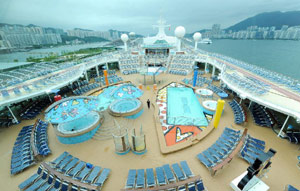 HK's new cruise terminal receives luxury liner
HK's new cruise terminal receives luxury liner
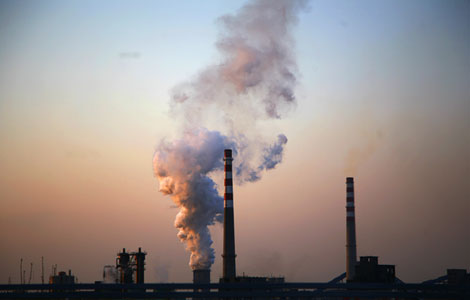 Future points to carbon trading
Future points to carbon trading
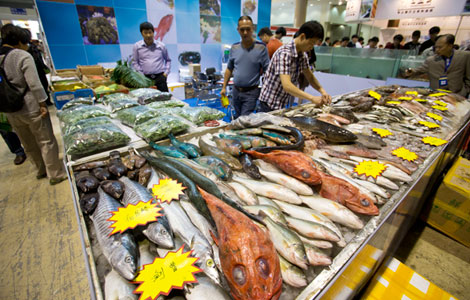 Seafood businesses flounder amid spending cut
Seafood businesses flounder amid spending cut
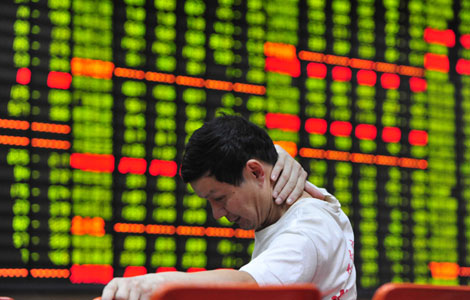 Equities slump amid slow-growth estimates
Equities slump amid slow-growth estimates
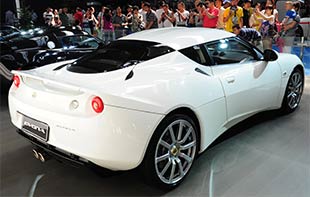 Auto show opens with much fanfare in Xi'an
Auto show opens with much fanfare in Xi'an
 Sunnylands summit fuels Chinese tourism interest
Sunnylands summit fuels Chinese tourism interest
 'Palace on wheels' on sale for $3.13m in Dubai
'Palace on wheels' on sale for $3.13m in Dubai
 Fortune smiles on Chengdu as forum concludes
Fortune smiles on Chengdu as forum concludes